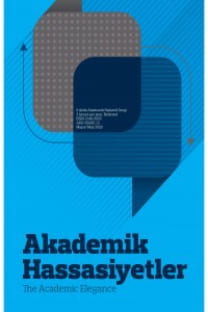CARRY TRADE 2000'Lİ YILLARDA TÜRKİYE İÇİN MÜMKÜN MÜ?
Carry trade, düşük
faizli para biriminden borçlanarak elde edilen kaynakla yüksek faizli para
birimine yatırım yapmak anlamına gelmektedir. UIP teorisine göre değeri düşük
olan para biriminde, iki para biriminin faiz makası kadar bir değerlenme olması
beklenir. Bu para birimleri “fonlama kuru” ve “yatırım kuru” olarak da
tanımlanır. Uluslararası sermaye akımlarının hızlanması ile birlikte carry
trade işlemleri büyük hacimlere ulaşmıştır. Dünyada fonlama kuru olarak
çoğunlukla, fonlama maliyeti en düşük olan Japon Yeni ve İsviçre Frangı
kullanıldığı görülmektedir. Bu çalışmada cevap aranan soru şudur: sermaye
girişinin artışı ve dalgalı kurla birlikte 2000’li yıllarda Türkiye finans
piyasaları carry trade için uygun bir ortam sağlamakta mıdır? Ampirik çalışmada
zaman serisi analizi yöntemiyle, USD/TL paritesi ile bu kurların faiz farkı
arasında regresyon yapılmıştır. Sonuç olarak iki değişken arasında zayıf bir
ilişki olduğu, modelin açıklayıcılık gücünün zayıf olduğu görülmüştür. Türkiye’nin
carry trade için elverişsiz, ya da oldukça riskli olduğu sonucuna varılmıştır.
Bu durum UIP teorisinin Türkiye şartlarında geçerli olduğunu doğrulamaktadır.
Anahtar Kelimeler:
Carry Trade, UIP
IS CARRY TRADE POSSIBLE FOR TURKEY IN THE 2000S?
Carry trade refers to investing in a high-interest
currency unit by borrowing from a low-interest currency. According to the UIP-Uncovered
Interest Rate Parity- theory, an appreciation of the low valued currency is
expected by the same amount as the yield spread between two currencies. These
currencies are defined as “funding currency” and “investment currency”. Mostly
Japanese Yen and Swiss Franc are used as funding currencies in the world,
because of the lowest funding costs. The question this study sought to answer
was whether Turkey's financial markets provide a suitable environment for the
carry trade along with the increase of capital inflows and floating rate in the
2000s. In this empirical study, a regression was made between the USD/TL parity
and the interest rate difference between these currencies. As a result, it is
concluded that the explanatory power of model is weak and the correlation is
weak between the two variables. Turkey is unfavorable or quite risky for carry
trade. This result confirms the theory of UIP for Turkey’s conditions.
___
- Albertsson, B. (2018). Is the Carry Trade strategy an explanation of the Uncovered Interest Parity puzzle? Lund University, School of Economics and Management,1-33
- Brunnermeier, M. K., Nagel S, Pedersen L, (2008). Carry Trades and Currency Crashes, NBER Macroeconomics Annual 2008, Volume 23, 313-347. Working Paper 14473
- Burnside, C., M. E. (2007). The Returns to Currency Speculation in Emerging Markets, NBER Working Paper No. 12916, 1-11.
- Chrıstiansen, C., Ranaldo, A., Söderlind, P. (2009). The Time-Varying Systematic Risk of Carry Trade Strategies, Swiss National Bank Working Paper ,1-42
- Decovny, S., Tacchi, C. (1991). Hedging Strategies, Woodhead-Faulkner Publishers Limited, 1-202
- Gagnon, J. E, Chaboud, A. P.(2007). What Can the Data Tell Us about Carry Trades in Japanese Yen?, International Finance Discussion Papers No: 899
- Li, M. (2011). An Evaluation Of Exchange Rate Models By Carry Trade, Journal of Economics and International Finance Vol 3(2), 72-87.
- Kohler, D. (2007). Carry Trades: Betting Against Safe Haven, Discussion Paper no. 2007-12 Department of Economics University of St. Gallen :1-35
- Plantin, G., Shin, H. S. (2006). Carry Trades and Speculative Dynamics https://dx.doi.org/10.2139/ssrn.898412, 1-39
- Spronk, R., Verschoor, W.F.C., Zwinkels, R.C.J., (2013). Carry Trade And Foreign Exchange Rate Puzzles, European Economic Review 60, 17-31.
- Vistesen, C. (2009). Carry Trade Fundamentals and the Financial Crisis 2007-2010, MPRA Paper No. 15265,1-28
- Yıldırtan, D. Ç. (2011). E-Wiews Uygulamalı Temel Ekonometri, Türkmen Kitabevi, İstanbul, 1-288
- Sevüktekin, M., Nargeleçekenler, M. (2010). Ekonometrik Zaman Serileri Analizi, Nobel Yayınevi, Ankara, 1-578
- https://tradingeconomics.com/ Erişim Tarihi: 15.01.2019 https://evds2.tcmb.gov.tr/ Erişim Tarihi: 15.01.2019
- ISSN: 2148-5933
- Yayın Aralığı: Yılda 3 Sayı
- Başlangıç: 2014
- Yayıncı: A Kitap
Sayıdaki Diğer Makaleler
KURUMSAL YÖNETİMİN HİSSE YATIRIMCISINA YARATTIĞI DEĞER: GELİŞMEKTE OLAN PİYASADA BİR AMPRİK ÇALIŞMA
Hüseyin ÖCAL, Mike Onder KAYMAZ
HİTİTLER: BOĞAZKÖY’DEN YÜKSELEN BİR YÖNETİM GÜNEŞİ
KAPİTALİZM KRİZLERİNİN KARL POLANYİ PENCERESİNDEN ANALİZİ
SON DÖNEM ÇAĞATAY TÜRKÇESİYLE YAZILMIŞ MİSBÂHU’L-ENVÂR ADLI ESERDE YÜKLEME VE İLGİ HÂLİ ÇEKİMİ
KOSOVA TARİH YAZIMINDA OSMANLI İMAJI ÜZERİNE TARTIŞMA: KOSOVA SAVAŞI VE İSKENDER BEY
AREND LIJPHART’IN KRİTERLERİ BAĞLAMINDA TÜRKİYE’DE DEMOKRASİ
Beyhan İNCEKARA, Erhan YILMAZ, Rahmi İNCEKARA
